- Who We Are
- Updates & News
- Standards
- Software Tools
- Network Studies
- Community Forums
- Education
- New To OHDSI?
- Community Calls
- Past Events
- Workgroups
- 2024 ‘Our Journey’ Annual Report
- Current OHDSI Events
- Support & Sponsorship
- CBER Best Seminars
- 2024 Global Symposium
- Guideline Opportunities
- Github
- YouTube
- Newsletters
CHARYBDIS: How The OHDSI Community Collaborated To Inform The COVID-19 Response, And Where It Goes From Here
Within 88 hours of global collaboration through open science, the OHDSI community set the foundation for boundless research possibilities during the deadliest pandemic in more than a century.
You can’t build a house without a foundation. Of course, you also don’t live on the foundation either. At that point, the work had only begun.
“It takes a village to move the needle,” said Kristin Kostka, a project co-lead and 2018 OHDSI Titan Award recipient. “I use that phrase a lot when it comes to the work we do in OHDSI. It was never more true this year.”
Welcome to CHARYBDIS Village.
Talita Duarte-Salles provided this presentation on the CHARYBDIS project during the plenary session of the 2020 OHDSI Global Symposium.
Characterizing COVID-19
The CHARYBDIS Project (Characterizing Health Associated Risks, and Your Baseline Disease In SARS-COV-2) had two goals when it was created in the months following the COVID-19 Study-A-Thon in late March.
1) Describe the baseline demographics, clinical characteristics, treatments, symptoms and outcomes of interest among individuals with COVID-19 overall and stratified by sex, age and specific comorbidities
2) Describe characteristics and outcomes of influenza patients between September 2017 and April 2018 compared to the COVID-19 population
Building on a study led by Ed Burn and published by Nature Communications entitled “Deep phenotyping of 34,128 adult patients hospitalized with COVID-19 in an international network study,” which generated real-world evidence on the natural disease history of COVID-19, CHARYBDIS co-leads Talita Duarte-Salles, Albert Prats-Uribe and Kostka led a community-wide effort to investigate deeper.
“Ed’s characterization study is the foundation of how we got to this spot,” Kostka said. “We quickly figured out we needed an over-arching frame to put everything into, so a lot of ideas that came in could be covered in one protocol.”
It was time to bring in the village.
Early Work
Phenotype development, led by (among many others) Gowtham Rao, Anna Ostropolets, Matthew Spotnitz, Azza Shoaibi, and Patrick Ryan, allowed the CHARYBDIS team to characterize COVID-19 disease natural history by defining diseases and populations of interest so that they could be systematically examined across the OHDSI network. That work carried into the late spring, and coincided with important literature review, led by Lana Lai and Hanieh Razzaghi (again, among others).
Burn and Prats-Uribe worked to develop a code that could generate the most immediate evidence possible on COVID-19, while data partners worked to get their data available to run when the package was available. Notably, Scott DuVall and Duarte-Salles provided critical leadership with their work around the VA and SIDIAP data, respectively — neither had run an OHDSI network study prior to the pandemic, and now they would provide critical data for its broadest study to date.
By the middle of the summer, more data networks were joining the CHARYBDIS journey, including the first OHDSI study for the University of Washington, and the global community came together to see where they could help inform the COVID-19 response.
“It was a massive work that helped me keep sane during this time by knowing we were helping get information needed to the world, and by collaborating with amazing people and being part of a community,” Prats-Uribe said.
Studies, Studies, Studies
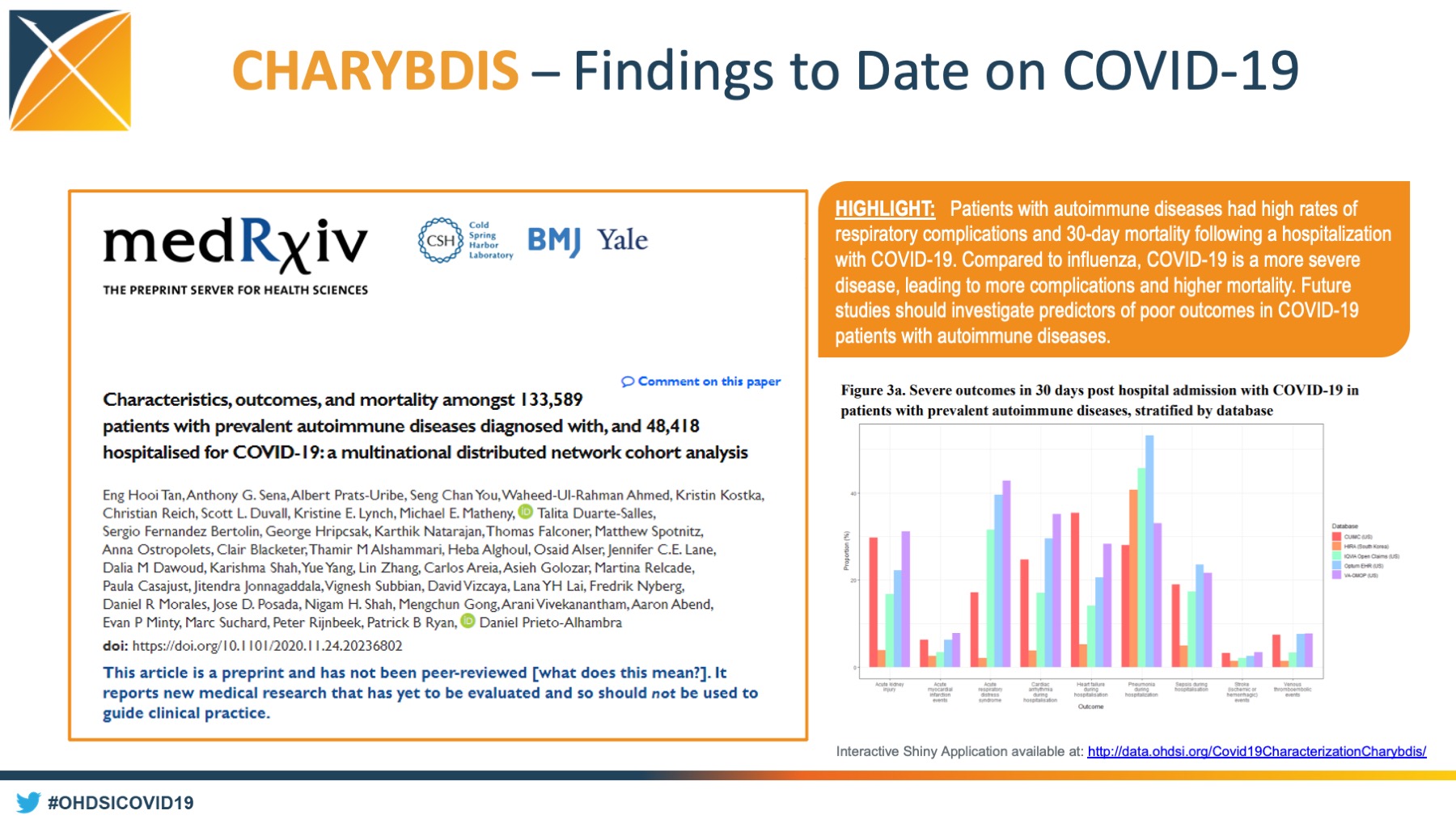
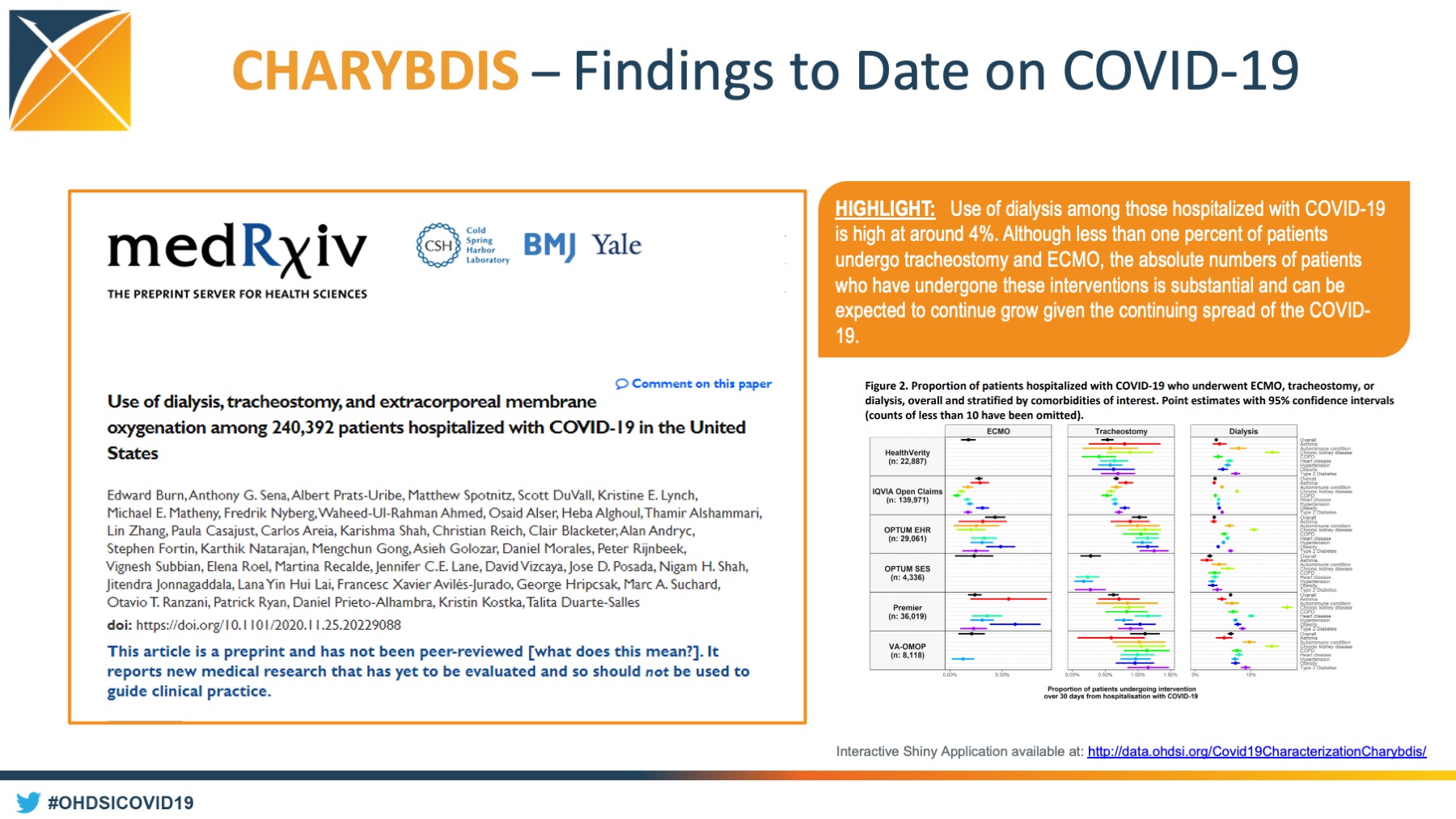
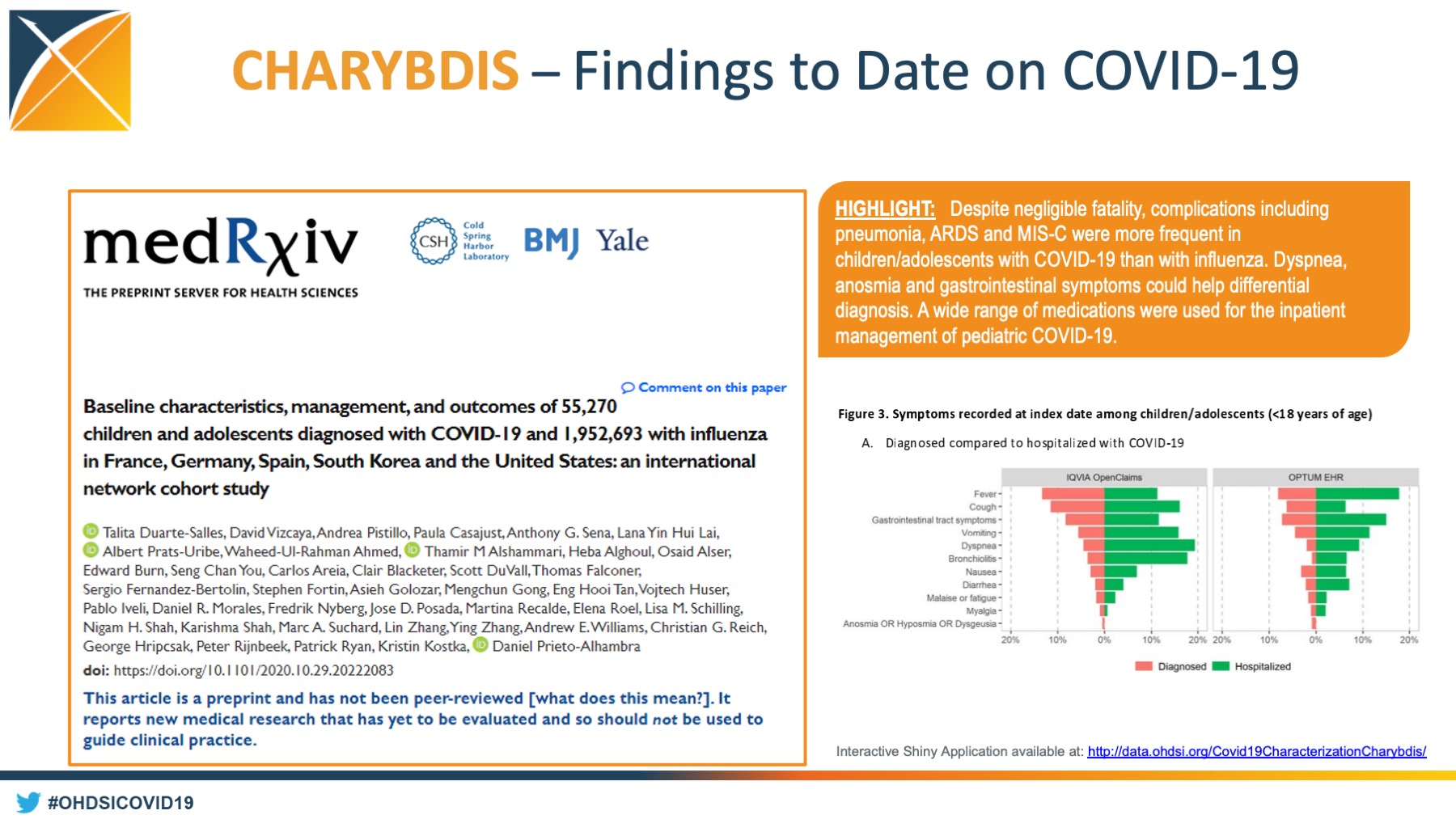

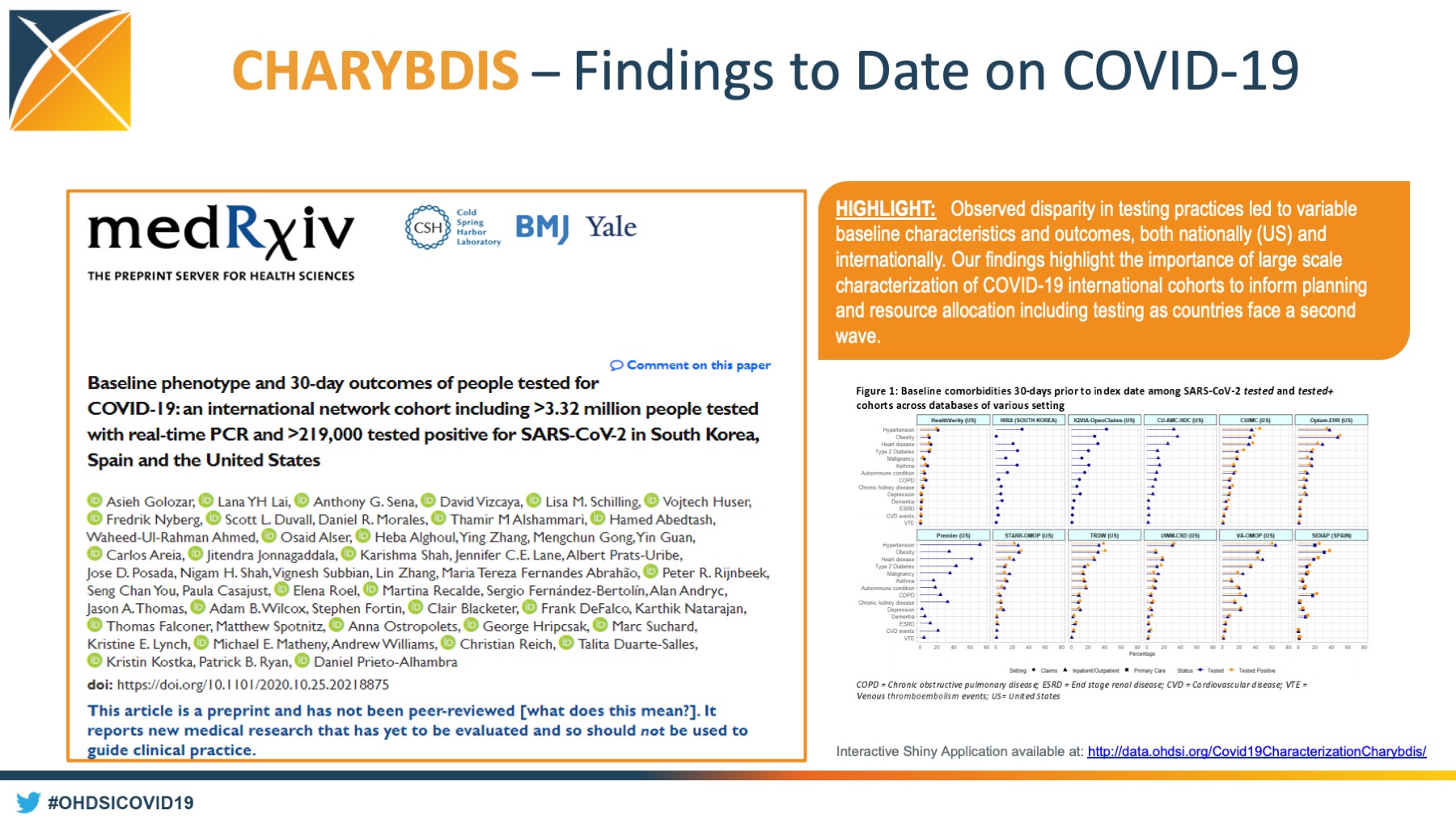




CHARYBDIS studies that have been posted on a preprint server. These are currently under peer review.
OHDSI collaborators often talk about the inspiration they find in each other. CHARYBDIS meetings, when multiple stakeholders from around the world gathered to discuss their own studies while offering assistance in others, served as great venues for both education and inspiration.
And, ultimately, the path to generate real-world evidence.
Below are examples of several CHARYBDIS study focuses.
| Study Focus | Study Leads | MedRxiv Link (if already posted) |
| Obesity | Elena Roel, Martina Recalde, Talita Duarte-Salles | https://www.medrxiv.org/content/10.1101/2020.09.02.20185173v1 |
| Drug Utilization | Albert Prats-Uribe, Daniel Prieto-Alhambra | https://www.medrxiv.org/content/10.1101/2020.09.15.20195545v2 |
| Autoimmune Diseases | Eng Hooi Tan (Cheryl), Daniel Prieto-Alhambra | https://www.medrxiv.org/content/10.1101/2020.11.24.20236802v1 |
| Pregnancy | Lana Lai, Asieh Golozar, Talita Duarte-Salles and Daniel Prieto-Alhambra | https://www.medrxiv.org/content/10.1101/2020.10.13.20211821v1 |
| Pediatrics | Talita Duarte-Salles, Daniel Prieto-Alhambra | https://www.medrxiv.org/content/10.1101/2020.10.29.20222083v1 |
| HIV | Julianna Kohler, Kristin Kostka, Rupa Makadia, Daniel Prieto-Alhambra | https://www.medrxiv.org/content/10.1101/2020.11.10.20229401v1 |
| Testing | Lana Lai, Asieh Golozar and Daniel Prieto-Alhambra | https://www.medrxiv.org/content/10.1101/2020.10.25.20218875v1 |
| Interventions | Edward Burn, Kristin Kostka, Talita Duarte-Salles | https://www.medrxiv.org/content/10.1101/2020.11.25.20229088v1 |
| Racial Disparities | Patrick Ryan, Shawn Bauldry | |
| Asthma | Daniel Morales | |
| Cancer | Elena Roel, Talita Duarte-Salles | |
| COPD | Daniel Morales | |
| Gender Differences | Kristin Kostka, Maura Beaton, Noemie Elhadad, Ru-fong Cheng | |
| General Clinical Study | Talita Duarte-Salles, Albert Prats-Uribe, Kristin Kostka |
How do you run this many network studies and create robust, reliable and reproducible real-world evidence when the disease itself hadn’t existed a year earlier. Major work went into creating the OHDSI COVID-19 network, which as of early December included 22 databases from three continents (North America 11, Europe 8 and Asia 3). Within that network, OHDSI collaborators studied:
– more than 7.4 million patients tested for SARS-COV-2
– more than 1.6 million patients diagnosed or tested positive for COVID-19
– more than 300,000 patients hospitalized with COVID-19
This level of work takes time. Let’s take one for example. The study “Characteristics and outcomes of 627,044 COVID-19 patients with and without obesity in the United States, Spain, and the United Kingdom,” led by Elena Roel, Martina Recalde, and Duarte-Salles, found that obesity is more common amongst COVID-19 than influenza patients, and that obese patients present with more severe forms of COVID-19 with higher hospitalization, intensive services, and fatality than non-obese patients.
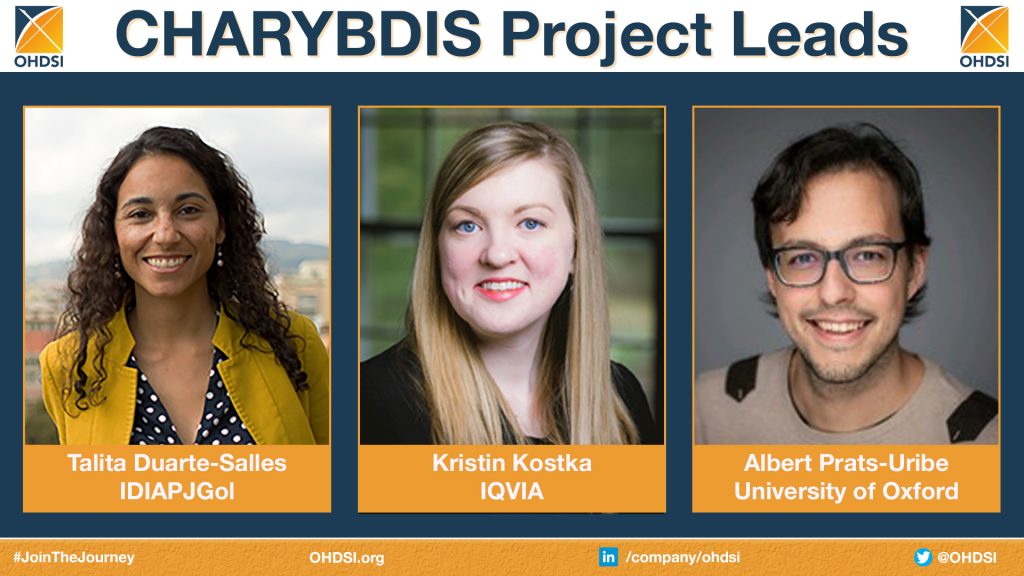 That study, which is currently under peer review, was not the first one of its kind to study the impact of obesity around the COVID-19 pandemic. But good luck finding another that includes 207,859 obese patients diagnosed with COVID-19 over three different countries, or 63,866 obese, hospitalized COVID-19 patients.
That study, which is currently under peer review, was not the first one of its kind to study the impact of obesity around the COVID-19 pandemic. But good luck finding another that includes 207,859 obese patients diagnosed with COVID-19 over three different countries, or 63,866 obese, hospitalized COVID-19 patients.
“How do we differentiate what we are doing so people know this is one of the biggest things you can tap into, even if other people publish a paper first?” Kostka said. “We have more diversity in terms of geography, we have larger sample sizes, we’ve done more curation of reliability of the information. The sausage-making may not be exciting, but it’s the OHDSI process that makes the results meaningful.”
Also, top health organizations around the world don’t rely on exciting. The authors of that obesity paper were asked to present their work to the World Health Organization (WHO) European Office (even if they weren’t sure at first that the request was real or an elaborate practical joke).
It was real.
“It was an honor to be invited and to have the opportunity to present the community work on obesity and COVID-19 at a WHO/Europe expert meeting,” said Duarte-Salles, a 2020 OHDSI Titan Award winner (Community Collaboration). “It is exciting to see the evidence generated in CHARYBDIS being recognized and used by regulatory and public health agencies to help in the design of recommendations to police makers. I think this is a big accomplishment and we should be very proud of the work we have done as a community this year in the fight against the pandemic.”
Research generated by the HIV study team was presented by a representative from USAID. Regulators have recognized both the clinical and methodological advances made within the OHDSI community this year — both in CHARYBDIS and beyond — and those advances are in line with OHDSI’s core mission of improving health by empowering a community to collaboratively generate the evidence that promotes better health decisions and better care.
"We’re in a really good position to make a valuable impact in the fight against this pandemic.
I know we set a really high bar in this community, as we should, and we tend to think about what else we could have done. But I couldn’t be prouder of the work this team did in 2020, and I’m very optimistic about what our community can accomplish through open science and collaboration moving forward."Kristin Kostka
The Path To 2.0
OHDSI collaborators have already turned their focus towards 2021 and how they can continue to assist the COVID-19 response. While the CHARYBDIS leadership team is appropriately proud of the afore-mentioned work in studying the disease natural history of COVID-19, they are also far more knowledgeable of both the disease itself, as well as the needs of both clinicians and researchers than they were in the summer.
Hence, the project leads have announced the beginning of CHARYBDIS 2.0, where the team can take the foundation of work already in place and build on it.
“I think one of the biggest challenges originally was knowing what to look for and what to expect so early in the pandemic,” Prats-Uribe said. “I am really looking forward to be able to get more data on how we have adapted to the pandemic and if we have decreased or increased inequities in testing, treatment and healthcare services delivery.”
“We don’t need to re-invent the wheel,” Kostka said. “We have a running start, but we do need to have a thought exercise within our community and decide what we need to include. For 1.0, we wanted to generate evidence as quickly as possible because we didn’t know anything. Now I think we are ready to tackle tougher problems.”
Time frames will be tight as the 2.0 team plans how to reimagine, and then refactor, the CHARYBDIS code, but global meetings have already been set. Collaborators who are interested in joining should reach out to the leadership team (Talita Duarte-Salles at tduarte@idiapjgol.org; Kristin Kostka at kristin.kostka@iqvia.com; Albert Prats-Uribe at albert.prats-uribe@ndorms.ox.ac.uk) or request access to the CHARYBDIS 2.0 team within the OHDSI MSTeams environment.
“We’re in a really good position to make a valuable impact in the fight against this pandemic,” Kostka said. “I know we set a really high bar in this community, as we should, and we tend to think about what else we could have done. But I couldn’t be prouder of the work this team did in 2020, and I’m very optimistic about what our community can accomplish through open science and collaboration moving forward.”
by Craig Sachson
